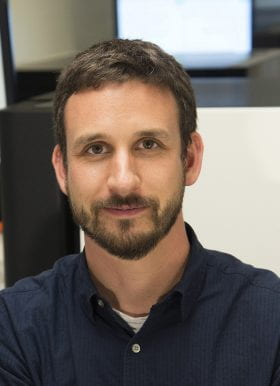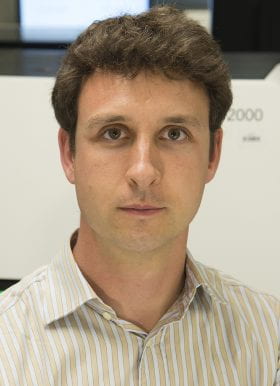Vaccines, drugs and modified human cells that activate the immune system against the tumor can improve the outcomes and prolong the lives of patients diagnosed with some type of cancers but have failed to provide survival benefits for brain tumor patients, including and especially those affected by glioblastoma – the most prevalent and aggressive form of malignant brain cancers. Our team develops novel therapies to help the immune system fight brain tumors.
- Virotherapy. The Zika virus public health epidemic provided us with a new approach to improve outcomes for patients with brain cancer. Our investigators discovered that Zika virus specifically targets and kills glioblastoma stem cells, leaving the rest of the adult human brain untouched. In mouse models of brain tumors, Zika virus also generates an intense immune response against the rest of the tumor. We have created a mutant and safe strain of Zika virus, which we hope to translate to patients in the next several years.
- Laser interstitial thermal therapy (LITT) as an immunotherapy. Through a proof-of-concept clinical trial initiated here at the Washington University BTC, our team is accumulating exciting evidence that LITT, when combined with immune checkpoint blockade, prolongs survival in patients with recurrent glioblastoma. Since checkpoint inhibitors as single agents have failed in glioblastoma in most contexts, these results suggest that LITT locally stimulates the immune system to unlock the potential of checkpoint inhibition. These results will motivate a larger and randomized clinical trial of LITT plus checkpoint inhibition.
- Personalized Vaccines. Washington University is a global leader in cancer immunology. Our investigators developed powerful cancer immunogenomics approaches in which novel tumor antigens recognized by T cells — so called neoantigens — could be predicted by analyzing tumor genomics data with computational methods. Based on these discoveries, we have developed novel clinical trials and ongoing preclinical studies for personalized therapeutic vaccines for brain cancers including glioblastoma.
- Multimodal nanoscale immunotherapeutics. A key to identifying effective immunotherapies is the development of therapeutics that impact multiple signaling pathways in immune cells. For example, checkpoint inhibitors, which stop specific immune cells from killing tumor cells, were effective in only a small population of glioblastoma patients. Other immune evasive mechanisms remain effective. Our investigators develop unique approaches, using multifunctional oligonucleotide-based nanotherapeutics to concomitantly target several immunomodulatory pathways.
- Neuroimmunology. Investigators at Washington University have recently begun to unlock the basis for brain-specific immune functions by determining the key cells and molecules in the brain and its covering (meninges). Our discovery of lymphatic vessels within meninges led to the realization that the brain and the immune system are more intimately connected than previously thought. This sets the stage for paradigm-shifting therapeutic approaches to enhance lymphatic function within the meninges to promote brain-specific anti-tumor immunity.
The Labs

Kim Lab
Laser-based surgery; LITT and the tumor microenvironment; Cancer stem cells and metabolism; Cancer stem cells and therapeutic resistance
Albert H. Kim, MD, PhD

Stegh Lab
Nanoscale therapeutics; Nanoscale therapeutics innate immunity; Cancer metabolism, Metabolism and Epigenetic control
Alexander H. Stegh, PhD










